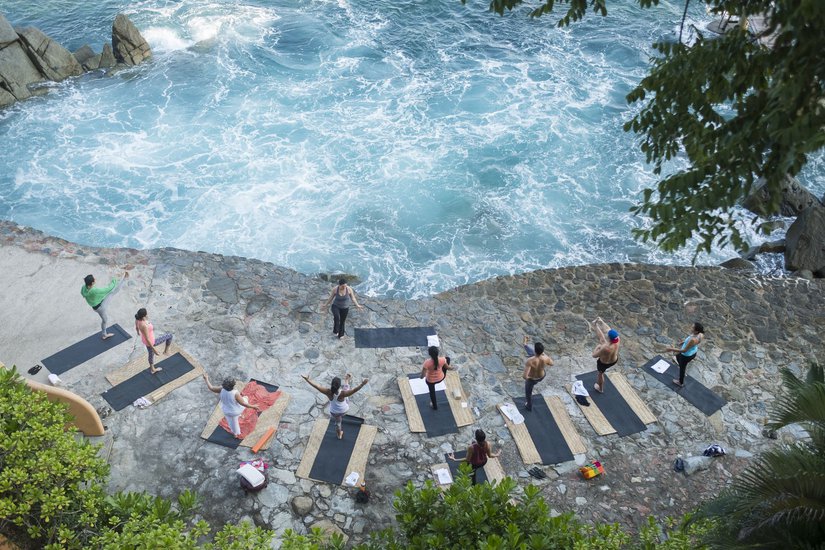Rehabilitation Retreats: Restoring Health And Wellness Through Travel

Are you feeling burnt out, stressed, or struggling with a health issue? If so, a rehabilitation retreat may be just what you need to restore your health and wellness. These retreats offer a unique opportunity to travel, relax, and receive specialized care to help you heal and rejuvenate.
Through a variety of programs, rehabilitation retreats cater to individuals of all ages and health conditions. Whether you’re recovering from an injury, managing chronic pain, or simply seeking a break from your daily routine, these retreats offer a holistic approach to wellness that will leave you feeling renewed and refreshed.
In this article, we’ll explore the benefits of rehabilitation retreats, the different types of programs available, and how to plan your perfect retreat experience.
Key Takeaways
- Rehabilitation retreats offer specialized care for health and wellness, catering to all ages and health conditions with a holistic approach to wellness.
- Activities such as yoga, meditation, physical therapy, nutritional education and healthy eating habits, counseling and therapy sessions, and a variety of programs are provided to meet individual needs.
- Choosing a location that allows for disconnection from everyday stresses and activities that align with personal goals and interests can enhance the rehabilitation retreat experience.
- Incorporating mindfulness and stress reduction techniques into daily routines can have long-lasting benefits for overall well-being.
Understanding the Benefits of Rehabilitation Retreats
You’re probably wondering why rehabilitation retreats are so beneficial for your health and well-being. Well, let me tell you, they can truly transform your life and leave you feeling refreshed and revitalized.
First and foremost, rehabilitation retreats offer a break from the stress and monotony of everyday life. By removing yourself from your usual environment, you’re able to fully disconnect and focus on your own well-being. This break allows you to recharge and reset your mind, body, and spirit.
In addition to providing a much-needed break, rehabilitation retreats also offer a variety of therapeutic activities and treatments. From yoga and meditation to massage and acupuncture, these activities are designed to promote relaxation, reduce stress, and improve overall health.
Many rehabilitation retreats also offer counseling and therapy sessions, which can be incredibly beneficial for those struggling with addiction, mental health issues, or other challenges. By participating in these activities and treatments, you’ll not only improve your physical health but also your mental and emotional well-being.
Finding the Right Retreat for Your Needs
To discover the ideal retreat for your specific needs, it’s important to carefully consider factors such as location, accommodations, and available activities. The first step is to determine the location that best suits your needs. Do you prefer a remote location or proximity to a city? Are you looking for a beachfront property or a mountain retreat? Once you’ve narrowed down your location preferences, you can start to research specific retreats in those areas.
Accommodations are another important factor to consider. Do you want a private room or are you comfortable sharing a room with others? What amenities are important to you, such as a pool or spa services? Consider the level of comfort you desire and what will help you feel relaxed and at ease. Lastly, be sure to look into the activities offered at each retreat. Are you interested in yoga or meditation classes? Do you want to participate in outdoor activities like hiking or kayaking? Make sure the retreat offers activities that align with your interests and goals for the trip.
| Factor | Importance | Examples of Options |
|---|---|---|
| Location | High | Beachfront, Mountain Retreat, Remote |
| Accommodations | Medium | Private Room, Shared Room, Pool, Spa Services |
| Activities | High | Yoga, Meditation, Hiking, Kayaking |
This table can help you to compare and contrast different retreats based on their offerings and how important those offerings are to you. By taking the time to consider these factors, you’ll be able to find a retreat that meets your needs and allows you to fully relax and restore your health and wellness.
Exploring Different Types of Rehabilitation Programs
If you’re struggling with addiction, exploring different types of rehab programs can be overwhelming but ultimately life-changing. The first type of program is inpatient rehab, which requires you to live at the facility for a period of time. This type of program offers 24-hour medical supervision and a structured environment that’s designed to help you focus on your recovery.
Inpatient rehab is best suited for those with severe addiction or those who’ve tried other forms of treatment without success. Another type of program is outpatient rehab, which allows you to live at home while attending treatment during the day. This type of program is less intensive than inpatient rehab but still provides access to counseling, therapy, and support groups.
Outpatient rehab is best suited for those with mild to moderate addiction or those who’ve completed inpatient rehab and need ongoing support. Ultimately, the type of rehab program you choose will depend on your individual needs and circumstances. It’s important to consult with a healthcare professional to determine the best course of treatment for you.
Embracing Holistic Wellness Practices
By incorporating holistic practices such as meditation, yoga, and nutrition, individuals can enhance their overall well-being and promote long-term recovery. These practices focus on treating the whole person, including their physical, mental, and emotional health.
Meditation, for example, can help individuals reduce stress and anxiety, while yoga can improve flexibility, strength, and balance. Proper nutrition is also essential for physical health and can help individuals feel more energized and mentally clear.
When you embrace holistic wellness practices during a rehabilitation retreat, you can experience a truly transformative experience. Imagine starting your day with a calming meditation session, followed by a nourishing breakfast filled with fresh fruits and vegetables.
Throughout the day, you participate in yoga classes that help you stretch and strengthen your body, and engage in group therapy sessions that help you connect with others and process your emotions. In the evening, you enjoy a delicious and nutritious dinner, followed by a mindfulness activity that helps you relax and unwind before going to bed.
By embracing these practices, you can restore your health and wellness and leave the retreat feeling rejuvenated and empowered.
Yoga and Meditation for Relaxation and Healing
Incorporating regular yoga and meditation practices into your daily routine can provide a sense of relaxation and promote healing for both the mind and body. Yoga is a physical practice that combines breath control, meditation, and specific poses to help reduce stress, increase flexibility, and improve overall health. Meditation, on the other hand, is a mental practice that involves focusing on the present moment and clearing the mind of any distractions. This can help reduce anxiety, improve sleep, and increase overall feelings of well-being.
To help you understand the benefits of yoga and meditation, take a look at this table outlining some of the physical and mental benefits of each practice:
| Yoga | Meditation |
|---|---|
| Increases flexibility | Reduces anxiety |
| Strengthens muscles | Improves sleep |
| Reduces stress | Increases feelings of well-being |
| Improves balance | Increases focus and concentration |
| Promotes relaxation | Lowers blood pressure |
Incorporating these practices into your daily routine doesn’t have to be time-consuming or difficult. Even just a few minutes of yoga or meditation each day can make a big difference in your overall health and well-being. So why not give it a try and see how these practices can benefit you?
Physical Therapy and Exercise for Recovery
You can improve your recovery by working with a physical therapist and incorporating exercise into your routine. Physical therapy is an essential component of rehabilitation because it helps you regain strength, mobility, and flexibility. A physical therapist can design a custom program based on your individual needs and goals, which may include exercises to increase range of motion, build muscle, and improve balance. They can also provide hands-on techniques such as massage and stretching to alleviate pain and stiffness.
In addition to physical therapy, exercise is also crucial for recovery. Regular exercise can improve your overall health and wellbeing, reduce the risk of future injuries, and help you maintain a healthy weight. It can also boost your mood and energy levels, which is especially important during the healing process.
Depending on your condition and abilities, your exercise routine may include low-impact activities such as swimming or yoga, or more strenuous workouts like weightlifting or running. Your physical therapist can guide you on the appropriate exercises to incorporate into your routine to help you achieve your goals and improve your recovery.
Nutritional Education and Healthy Eating Habits
Learning about nutrition and adopting healthy eating habits can greatly enhance your recovery process and improve your overall wellbeing. At a rehabilitation retreat, you’ll have access to expert nutritionists who can teach you about the importance of a balanced diet and provide you with a personalized meal plan that meets your individual needs.
You’ll also have the opportunity to participate in cooking classes and learn how to prepare healthy and delicious meals that you can easily replicate at home. By focusing on nutritious foods, you can aid in the healing process, reduce inflammation, and improve your energy levels.
Additionally, adopting healthy eating habits can help you maintain a healthy weight, reduce your risk of chronic diseases, and improve your mental health. Overall, incorporating nutritional education and healthy eating habits into your recovery journey can have long-lasting benefits and improve your overall quality of life.
Mindfulness and Stress Reduction Techniques
Take a moment to practice mindfulness and stress reduction techniques, allowing yourself to fully relax and focus on your inner peace. These techniques can include meditation, deep breathing exercises, and yoga.
By incorporating mindfulness into your daily routine, you can reduce stress levels, improve your mental clarity, and boost your overall well-being. Meditation is a great way to practice mindfulness and reduce stress. Find a quiet place to sit or lie down, close your eyes, and focus on your breath. Allow your thoughts to come and go, without judgment or attachment.
Deep breathing exercises are also effective in reducing stress and increasing relaxation. Take slow, deep breaths, filling your lungs with air and exhaling slowly. Finally, yoga is a physical practice that incorporates mindfulness, breathing techniques, and movement, helping to reduce stress and improve flexibility and strength.
By incorporating these mindfulness and stress reduction techniques into your daily routine, you can restore your health and wellness while traveling on a rehabilitation retreat.
Planning Your Perfect Rehabilitation Retreat Experience
Get ready to plan the ultimate rehabilitation getaway experience, where you can focus on rejuvenating and rebuilding your mind and body.
Start by choosing a location that speaks to your soul. Whether it’s a peaceful beach town or a mountain retreat, find a place that will allow you to disconnect from the stresses of everyday life and truly unwind.
Once you’ve chosen your destination, consider what activities you want to participate in. Many rehabilitation retreats offer a variety of options such as yoga, meditation, hiking, and spa treatments. Make sure to choose activities that align with your personal goals and interests.
Finally, take the time to research different retreat centers and read reviews from previous participants to ensure that you find a program that fits your needs.
With a little planning, you can create the perfect rehabilitation retreat experience for yourself and return home feeling refreshed and renewed.
Frequently Asked Questions
Are rehabilitation retreats covered by insurance?
Unfortunately, it’s unlikely that rehabilitation retreats are covered by insurance. It’s best to check with your insurance provider to see if they offer any coverage for these types of programs.
What is the average cost of a rehabilitation retreat?
You can expect to pay around $12,000 to $60,000 for a rehabilitation retreat. The cost varies based on the location, length of stay, type of therapy, and amenities offered.
Can I bring a companion or family member to the retreat with me?
Yes, you can bring a companion or family member with you to the retreat. It’s important to check with the retreat beforehand to ensure they allow it and to discuss any additional costs.
What is the typical length of a rehabilitation retreat program?
The typical length of a rehabilitation retreat program varies, but it can range from a few days to several weeks. The duration depends on the specific needs of the individual and the type of program they choose.
Are there any age restrictions for participating in a rehabilitation retreat?
“You may be wondering if there are any age restrictions for participating in a rehabilitation retreat. The answer varies depending on the specific program, so it’s important to research beforehand to ensure eligibility.” ‘However, many rehabilitation retreats have a minimum age requirement of 18 years old due to legal and ethical considerations.’
Conclusion
Congratulations! You’ve learned about the many benefits of rehabilitation retreats and how they can help restore your health and wellness through travel.
By choosing the right retreat for your needs and exploring different types of rehabilitation programs, you can embrace holistic wellness practices like yoga and meditation, physical therapy and exercise, nutritional education, and stress reduction techniques.
Remember to plan your perfect rehabilitation retreat experience by setting goals and expectations, researching different locations and programs, and communicating with the retreat staff about your specific needs.
With dedication and commitment to your health and wellness, a rehabilitation retreat can be a transformative experience that helps you achieve your goals and improve your overall well-being.
So why wait? Start planning your rehabilitation retreat today!









